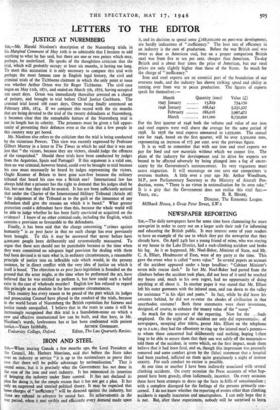IRON AND STEEL
SIR,—When touring Canada a few months ago, the Lord President of the Council, Mr. Herbert Morrison, said that before the State takes over an industry or service "it is up to the nationalisers to prove their case that there will be public advantage by nationalisation." That is sound sense, but it is precisely what the Government has not done in the case of the iron and steel industry. It has announced -its intention of bringing the industry under State control. It has not declared its Plan for doing it, for the simple reason that it has not got a plan. It has only an unproved and untried political theory. It may be expected that loose charges of "inefficiency" will be directed against the industry, but these are refuted in advance by sound fact. Its achievements in the ;vat period, when it met swiftly and efficiently every demand made upon
it, and its decision to spend some £168,0430,000 on post-war development, are hardly indications of " inefficiency." The best test of efficiency in an industry is the cost of production. Before the war British coal was twice as dear as American coal, but on a proper comparison British steel was from five to ten per cent. cheaper than American. To-day British coal is about four times the price of American, but our steel prices are only slightly higher than those of the States. So much for the charge of " inefficiency."
Iron and steel exports are an essential part of the foundation of our overseas trade, and the industry has shown striking speed and ability in turning over from war to peace production. The figures of exports speak for themselves :— Month Quantity (tons)
Value (k) 1945 January
15,829 734,150 1946 January 168,642 5,231,527 February 186,4318 5,997,472 March
211,000
6,750,000 For the first 'quarter of 1946 both the volume and value of our iron and steel exports were well above the average for the same period of 1938. In 1938 the total exports amounted to 1,959,000. The annual rate for 1946, based on the first quarter, will be over 2,300,000 tons, representing an increase of 171 per cent. over the previous figure.
It is as well to remember that with our iron and steel exports we pay for food and raw materials without which we cannot live. The plans of the industry for development and its drive for exports are bound to be affected adversely by being plunged into a fog of uncer- tainty by the Governinent's announcement. Its very vagueness must cause stagnation. It will encourage no one save our competitors jn overseas markets. A little over a year ago Mr. Arthur Woodburn, M.P., now Parliamentary Secretary to the Ministry of Aircraft Pro- duction, wrote, " There is no virtue in nationalisation for its own sake.'' It is a pity that the Government does not realise this vital fact.—
Director, The Economic League.
Millbank House, 2 Great Peter Street, S.W.'






























 Previous page
Previous page